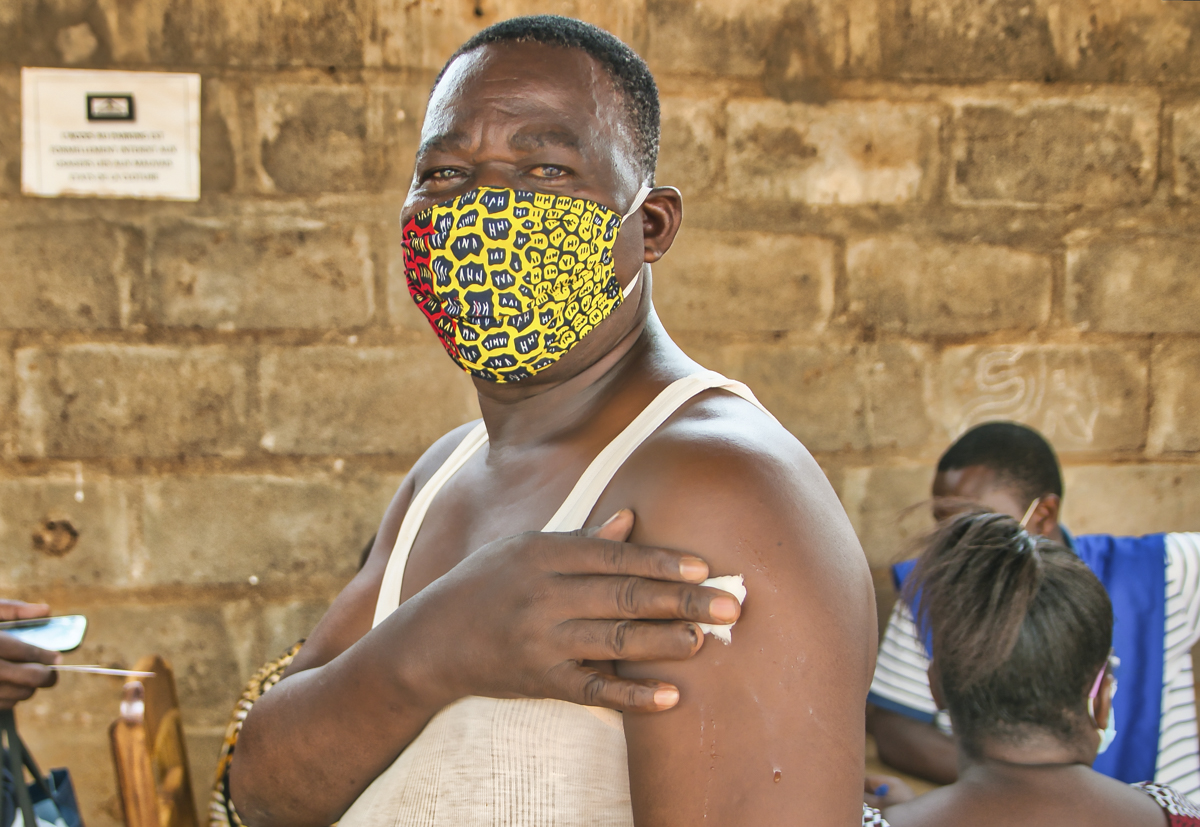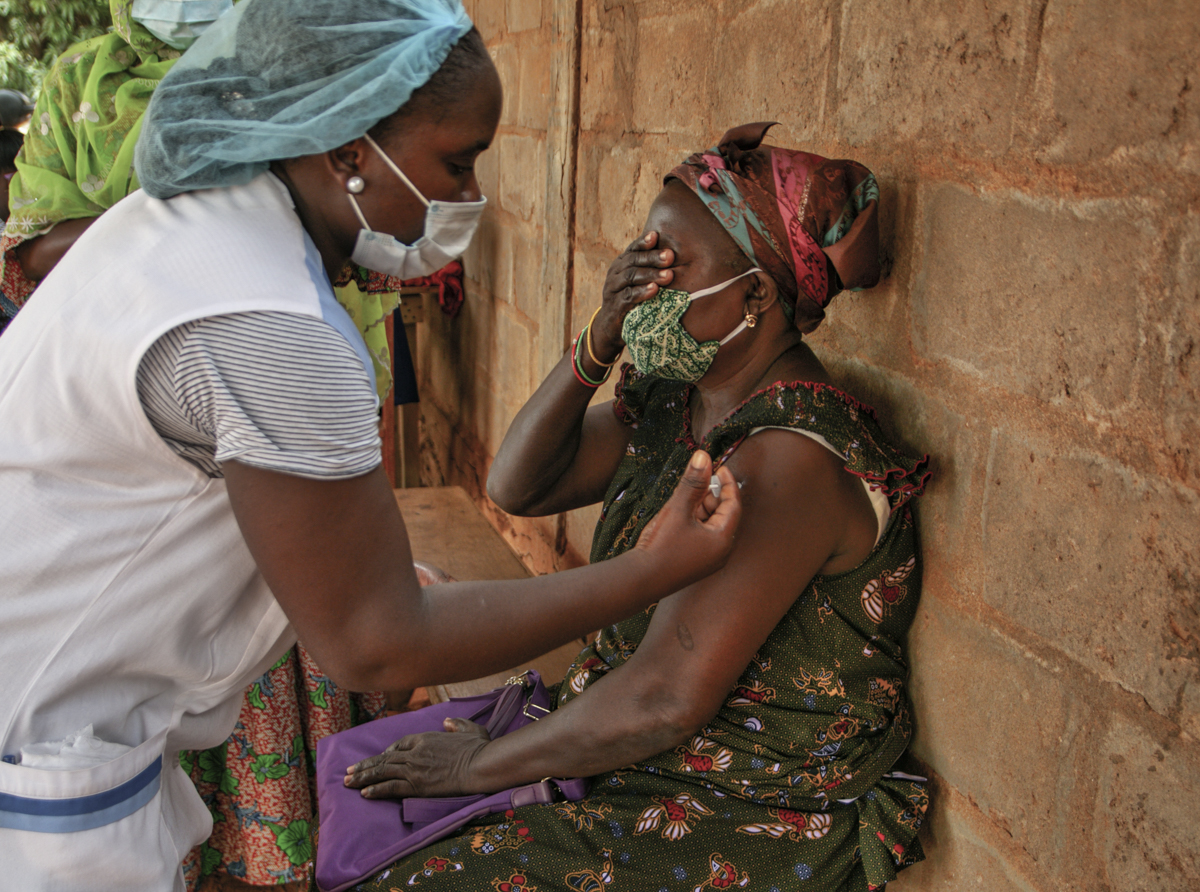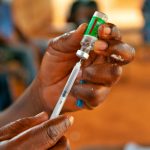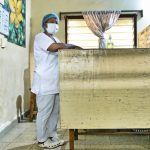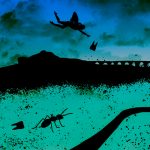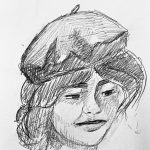View From a Pandemic: Is the Vaccine a Necessary Evil? Wondering in Togo
ARTICLE ET PHOTOGRAPHIES PAR AJ JOHNSON
TRADUCTION ANGLAISE PAR KAMI L. RICE
STORY AND PHOTOS BY AJ JOHNSON
ENGLISH TRANSLATION BY KAMI L. RICE
Un reportage fait en mars/avril 2021.
Based on reporting done in March/April 2021.
Au Togo, la campagne de vaccination contre la Covid-19 a commencé le 11 mars 2021, grâce à l’initiative Covax, qui a délivré un premier lot de 156.000 doses du vaccin AstraZeneca. Covax est une initiative de l’Organisation mondiale de la Santé (OMS) qui, parmi ses plusieurs objectifs, assure un accès équitable aux produits de diagnostic, de traitements et de vaccins contre la Covid-19.
Les doses reçues étant en nombre limité, le gouvernement togolais a mis en place un plan de vaccination en plusieurs phases. Ce plan préconise l’administration des premières doses du vaccin au personnel du corps médical, ensuite aux personnes âgées de 50 ans et plus, puis aux personnes plus jeunes souffrant d’une maladie chronique, et enfin au reste de la population de plus de 20 ans. Un site web officiel a ainsi été mis en place pour gérer la campagne de vaccination.
In Togo, thanks to the Covax Initiative, the COVID-19 vaccination campaign began on March 11, 2021, following the receipt of a first batch of 156,000 doses of the AstraZeneca vaccine. Covax is a World Health Organization initiative that among its several objectives ensures equitable access to diagnostic products, treatments, and vaccines against COVID-19.
Since a limited number of doses were received, the Togolese government implemented a multi-phase vaccination plan. This plan calls for the first doses to be administered to medical personnel, then to people aged 50 and older, next to people under 50 suffering from a chronic disease, and finally to anyone 20 years old and up. An official website was set up to manage the vaccination campaign.
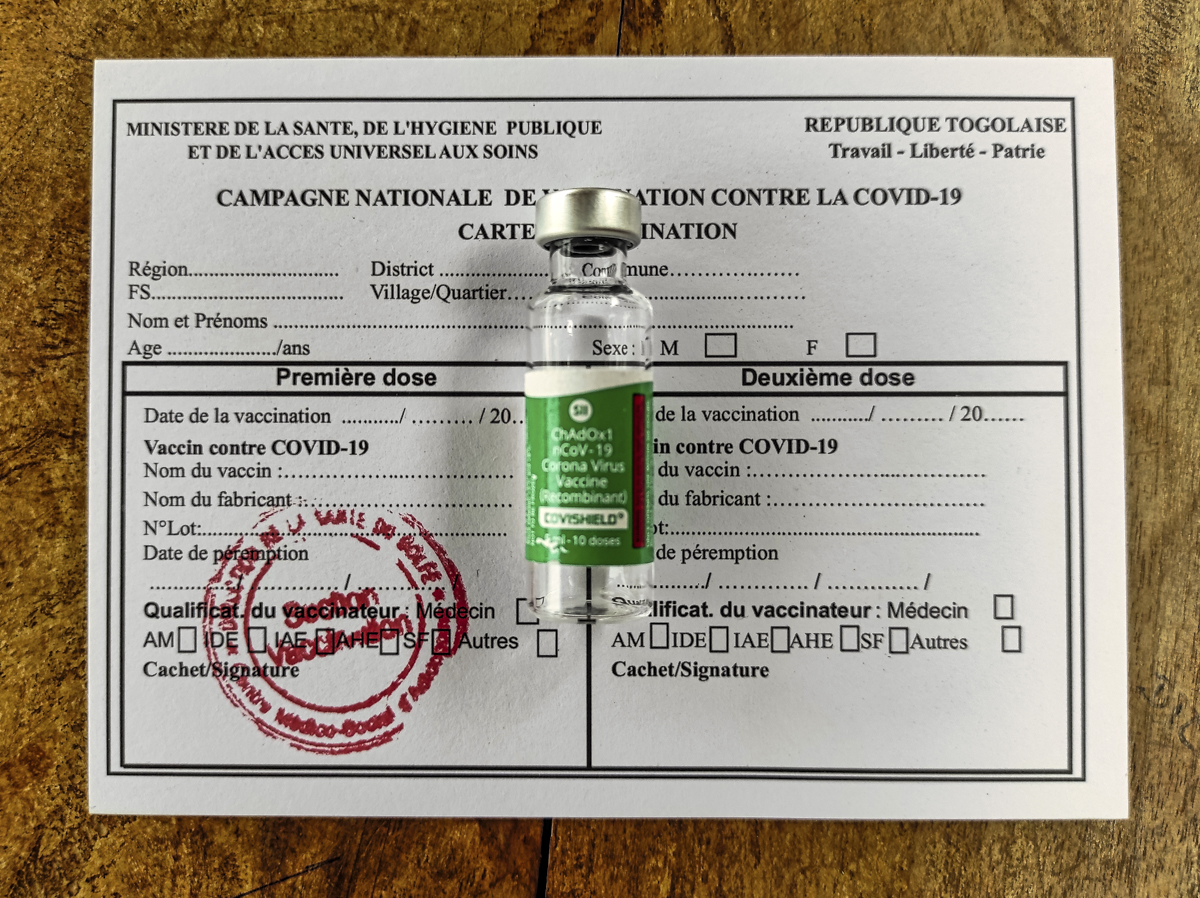
1:
J’ai entendu beaucoup de personnes dire catégoriquement qu’ils n’étaient pas prêts à accepter le vaccin pour plusieurs raisons.
Beaucoup de rumeurs qui continuent à circuler sur le net, les réseaux sociaux et même sur certaines chaines de télévisions ont contribué à créer une hantise, des craintes profondes et des doutes tenaces contre le vaccin, surtout le vaccin AstraZeneca.
« Le vaccin, là, moi et ma famille nous ne le prendrons pas ! J’ai même écrit à mes responsables aux États-Unis que je ne voyagerais pas, si je devais obligatoirement me faire vacciner … parce qu’il y a des idées cachées derrière qu’on ne nous dit pas », propos tenus par le responsable d’une organisation d’aide basée à Lomé, M. Sika, qui n’a pas voulu donner plus de détails sur les « idées cachées » dont il a parlé.
Renchérit Koffi, un joueur de basketball à Lomé, « Moi, je ne suis pas trop fan de cette vaccination, sincèrement parlant, vu toutes les spéculations qui se font autour. » Pour lui, « pour faire sortir un vaccin, il faut des années et des années, pour tester, re-tester, évaluer et améliorer afin de s’assurer de la qualité et de l’efficacité du vaccin. »
I have heard many people say categorically that for several reasons, they are not ready to accept the vaccine.
Many rumors circulating on the internet and social networks and even on some TV channels have contributed to creating dread, deep fear, and persistent doubt against the vaccine, especially the AstraZeneca vaccine.
“My family and I will not take the vaccine! I even wrote to my bosses in the United States that I would not travel if I had to get the vaccine … because there are ideas hidden behind it that they don’t tell us,” said Mr. Sika, the head of a Lomé-based aid organization, who didn’t want to elaborate on the “hidden ideas” he mentioned.
Koffi, a basketball player in Lomé, adds, “I’m not a big fan of this vaccination, sincerely speaking, given all the speculations that are made around it.” For him, “to bring out a vaccine, it takes years and years, to test, retest, evaluate, and improve in order to ensure the quality and effectiveness of the vaccine.”
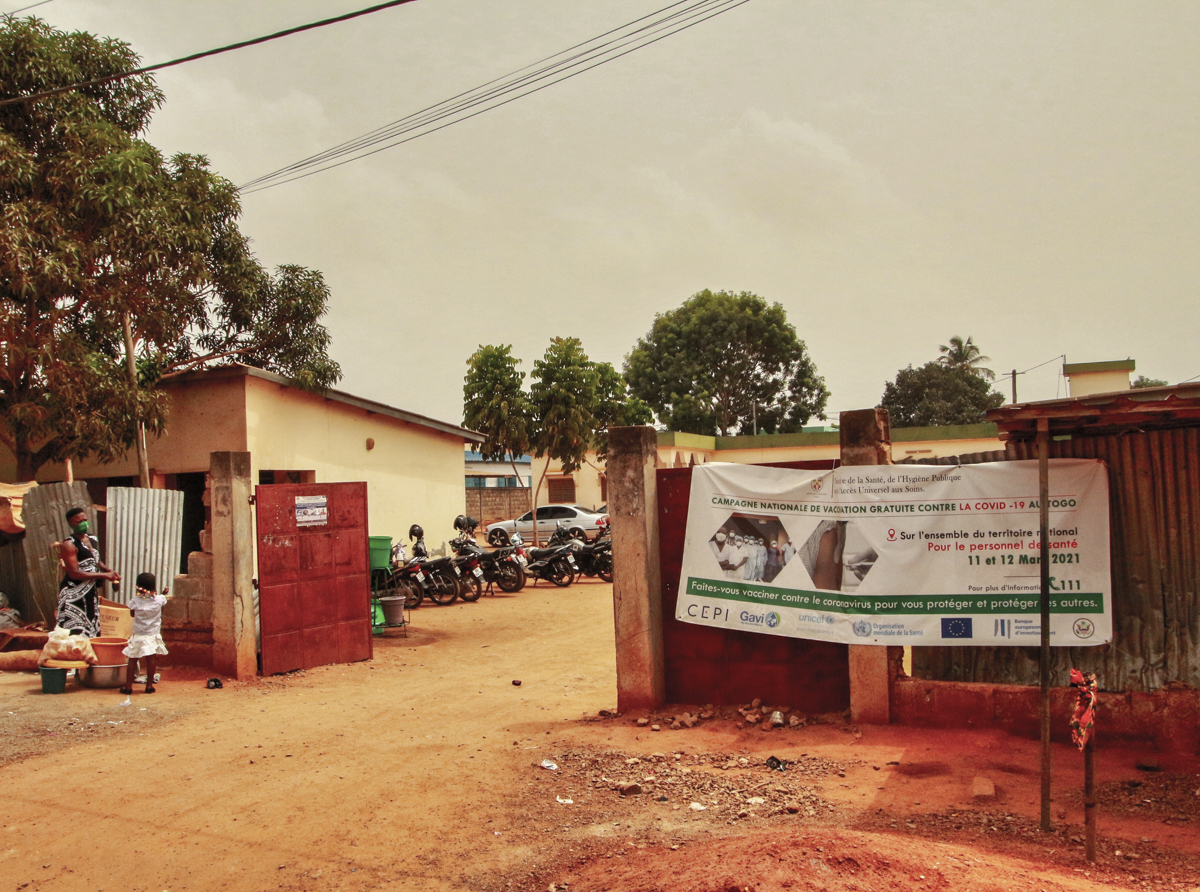
2:
Koffi, comme beaucoup de togolais, s’interroge sur la qualité des vaccins qui sont envoyés en Afrique :« Et qui nous dit que ce sont les bonnes doses qu’on nous envoie ici en Afrique (et au Togo) ? … On sait très bien que même les produits pharmaceutiques que nous avons dans nos pharmacies ne sont pas les mêmes que ceux disponibles en occident ! »
Au Togo, et un peu partout en Afrique, le fait que beaucoup de pays européens aient émis des réserves par rapport aux vaccins, surtout AstraZeneca, a encore plus exacerbé les craintes des uns et des autres.
Au moment de la suspension de l’utilisation du vaccin AstraZeneca par plusieurs pays d’Europe en mars et avril, nombreux comme Koffi se sont posés cette question : « Pourquoi notre gouvernement maintient-il toujours de continuer la campagne de vaccination en utilisant le vaccin AstraZeneca alors que même les pays occidentaux émettent des doutes et des réserves ? »
Un professeur togolais en mission en Europe traduit clairement le scepticisme et le doute que beaucoup de togolais et d’africains ont à l’égard de nos gouvernements. « Ici en France, je le ferai dès que mon tour arrivera. Mais, à Lomé, je chercherais à m’informer encore plus. Car chez nous, on peut laisser n’importe quoi venir sur le marché et vacciner les gens avec. »
Like many Togolese, Koffi wonders about the quality of the vaccines sent to Africa: “And who is to say that these are the right doses that are sent to us here in Africa (and in Togo)? … We know very well that even the pharmaceutical products we have in our pharmacies are not the same as those available in the West!”
In Togo, and throughout Africa, the fact that many European countries had expressed reservations about the vaccines, especially AstraZeneca, further exacerbated the fears of some.
When several European countries suspended the use of the AstraZeneca vaccine in March and April, many people, like Koffi, asked themselves this question: “Why is our government still maintaining the vaccination campaign using the AstraZeneca vaccine when even Western countries are expressing doubts and reservations?”
A Togolese professor working in Europe clearly expresses the skepticism and doubt that many Togolese and Africans have towards our governments. “Here in France, I will be vaccinated as soon as my turn comes. But in Lomé, I would try to get more information. Because back home, anything is allowed to enter the market and vaccinate people.”
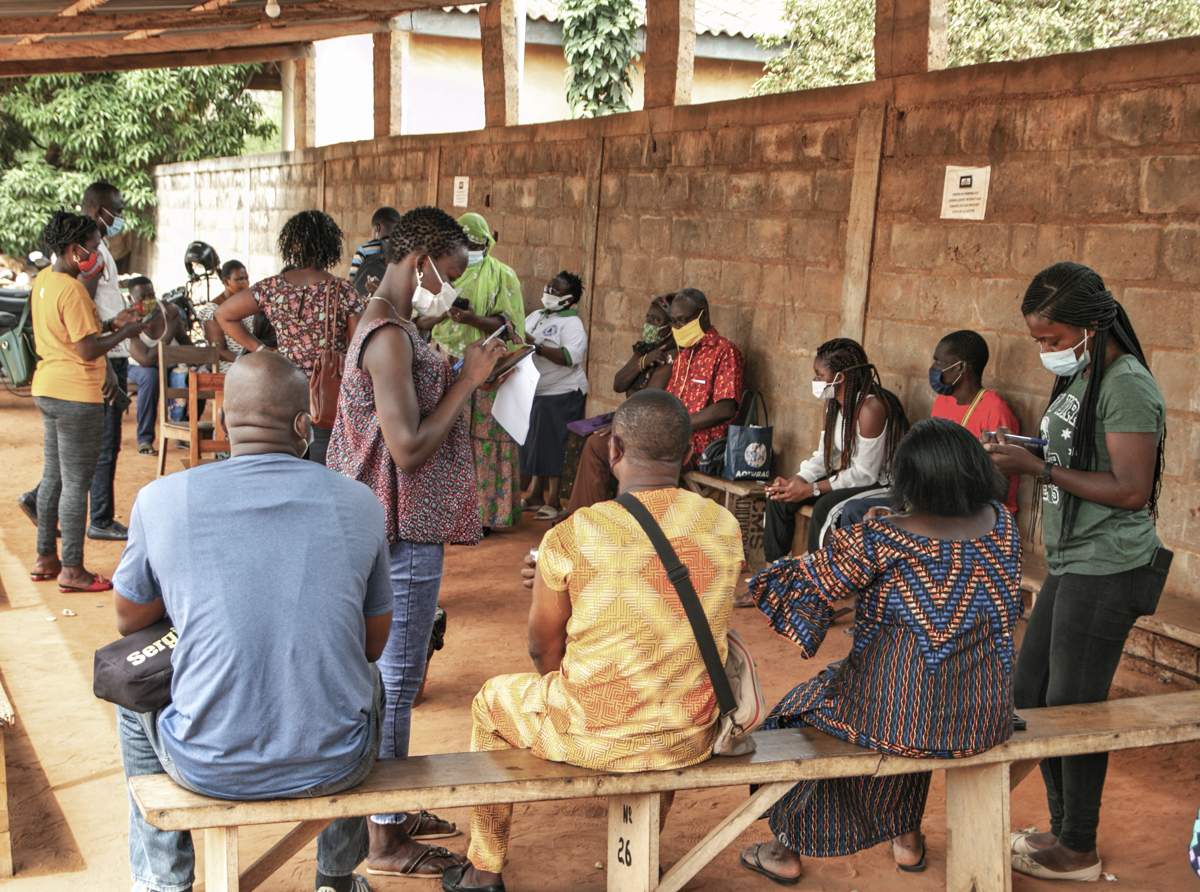
3:
Pourtant, certains voyaient dans la vaccination contre le Covid-19, une porte de sortie à cette pandémie.
Liberté Togo, un journal très souvent critique envers le parti au pouvoir au Togo, accueillait la campagne de vaccination avec espoir, selon un article publié le 16 mars 2021 : « Cette vaccination est la bienvenue quand on sait que depuis quelques semaines, les cas de nouvelles contaminations se recensent par dizaines chaque jour. Surtout dans le Grand Lomé, des foyers de contaminations massives ont été enregistrés. »
Cet article insistait aussi sur l’importance de faire une bonne communication et de montrer le bon exemple, auprès du Sommet de l’État : « Il faut donc, parallèlement aux activités de vaccination, intensifier la communication et la sensibilisation autour du mal. La réalité est que la majorité des Togolais ont appris à vivre avec la pandémie. Malheureusement, de la mauvaise manière puisque les mesures barrières observées au début de la crise sanitaire dans le pays ne sont plus observées. Les poignées de mains se multiplient, le lavage des mains est abandonné et le port de masque est négligé. »
However, some people see the vaccination against COVID-19 as a way out of the pandemic.
Liberté Togo, a newspaper that is very often critical of Togo’s ruling party, welcomed the vaccination campaign with hope in an article published March 16, 2021: “This vaccination is welcome when we know that for several weeks, the cases of new contaminations count in the tens every day. Especially in Greater Lomé, clusters of massive contamination have been recorded.”
This article also insisted on the importance of good communication and of setting a good example at the top levels of the government: “It is therefore necessary, in parallel with vaccination activities, to intensify communication and awareness around the disease. The reality is that the majority of Togolese have learned to live with the pandemic. Unfortunately, in the wrong way, since the protective measures observed at the beginning of the health crisis in the country are no longer observed. Handshakes are multiplying, handwashing is being abandoned, and the wearing of masks is being neglected.”
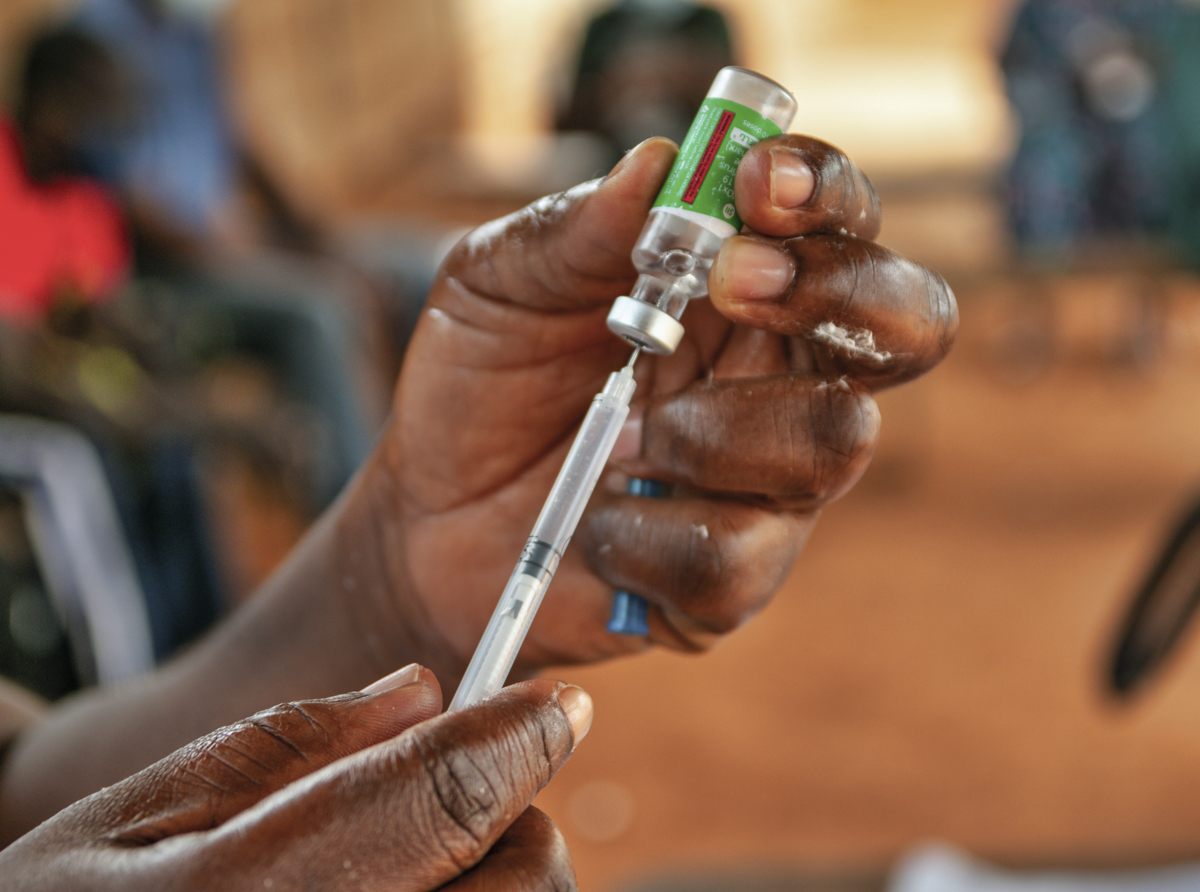
4:
Pour Anansé, un journaliste basé à Lomé, la communication des médias, au début de la crise, a joué un « mauvais rôle » en créant une psychose générale : “Aux premières heures de la maladie, la communication était basée sur les relevés macabres journaliers. 10.000 morts aujourd’hui en Espagne, 15.000 morts en Italie, et cetera. On nous rebattait les oreilles sans cesse de ces nouvelles effroyables. Ce qui a engendré une psychose mondiale. Il a fallu des jours avant que les médias occidentaux parlent du cas des guéris. Trop tard. »
D’autres éléments de communication sur la pandémie vont plus tard accentuer non seulement la psychose mais aussi la réticence, le doute et influer profondément les attitudes diverses face à la pandémie. Pour Anansé, il s’agit « des débats sur la question des traitements possibles du Covid-19 : faut-il prendre la chloroquine ou pas, faut-il prendre le Covid Organics malgache ou pas, l’imbroglio sur l’AstraZeneca. Pour ne citer que ces exemples-là”.
Les erreurs de communication sur la pandémie dès le départ ont aussi été pointées du doigts par Claire Wardle, Directrice américaine de First Draft. En effet, face au Parlement britannique lors d’une session sur la désinformation sur le coronavirus, elle a déclaré : « il est facile d’écarter les complots, mais nous devons comprendre pourquoi ils perdurent. »
Selon elle, les théories complotistes ont pris racine parce que l’origine du virus n’a pas été clairement établie : « Il n’y a pas de bonne histoire d’origine pour le virus, et donc ce vide d’information permet à la désinformation de circuler. »
Anansé poursuit : « Chez nous au Togo, c’est le bazar en termes de communication. Le comité mis en place ne maîtrise pas, à mon sens, la communication de crise. Communiquer sur une crise mondiale ne doit pas être de l’amateurisme. On envoie tout le monde sur les médias avec à l’arrivée des contradictions. En réalité, le comité piloté par Djibril Mohaman [coordonnateur national de la gestion de la riposte contre le Covid-19 au Togo] souffre, à mon sens, d’une certaine carence : l’absence de sociologue, d’anthropologue. » D’après Anansé, pour arriver au bout d’une maladie « importée » ou sensibiliser les populations, il faut partir de leurs croyances et perceptions.
«‘Quand les gens ne peuvent avoir accès facilement à une information fiable sur les vaccins et quand la défiance envers les personnes et institutions liées aux vaccins est importante, la désinformation vient très rapidement remplir ce vide’ et insuffler progressivement une méfiance grandissante contre les » vaccins, avait relevé First Draft dans une étude rapportée par Ouest-France en novembre 2020.
For Anansé, a journalist based in Lomé, media communication at the beginning of the crisis played a “bad role” by creating a general panic: “In the early hours of the disease, communication was based on the gruesome daily death tolls. Ten thousand deaths today in Spain, 15,000 deaths in Italy, et cetera. We heard these horrifying numbers nonstop. This created a worldwide hysteria. It took days before the Western media talked about people who recovered. Too late.”
Also problematic in terms of communication about the pandemic were other unanswered questions that heightened not only the panic but also the reluctance and doubt that have influenced the varied positions regarding the pandemic and the truth of the situation. For Anansé, poor communication opened the door for “debates on the question of possible treatments for COVID-19: should we take chloroquine or not, should we take Covid Organics from Madagascar or not, the quandary over AstraZeneca, to mention only these examples.”
The communication errors from the beginning of the pandemic have also been pointed out by Claire Wardle, American director of First Draft. Indeed, in front of the British Parliament during a session on misinformation about the coronavirus, she said, “It is easy to dismiss conspiracies, but we have to understand why they’re taking hold.”
According to her, conspiracy theories have taken root because the origin of the virus has not been clearly established: “There isn’t a good origin story for the virus, and so this information vacuum is allowing misinformation to circulate.”
Anansé continues: “Here in Togo, it is a mess in terms of communication. The committee that has been set up does not, in my opinion, understand crisis communication. Communicating on a global crisis should not be done by amateurs. We send everyone to speak to the media and end up with contradictions. In reality, the committee led by Djibril Mohaman [national coordinator for the management of the response to COVID-19 in Togo] suffers, in my opinion, from a certain deficiency: the absence of a sociologist, an anthropologist.” According to Anansé, in order to get to the other side of an “imported” disease or to sensitize people about it, one must start from their beliefs and perceptions.
“‘When people can’t easily access reliable information around vaccines and when mistrust in actors and institutions related to vaccines is high, misinformation narratives rush in to fill this vacuum,’ and gradually instill a growing distrust against vaccines,” Ouest-France quoted from a study released by First Draft in November 2020.
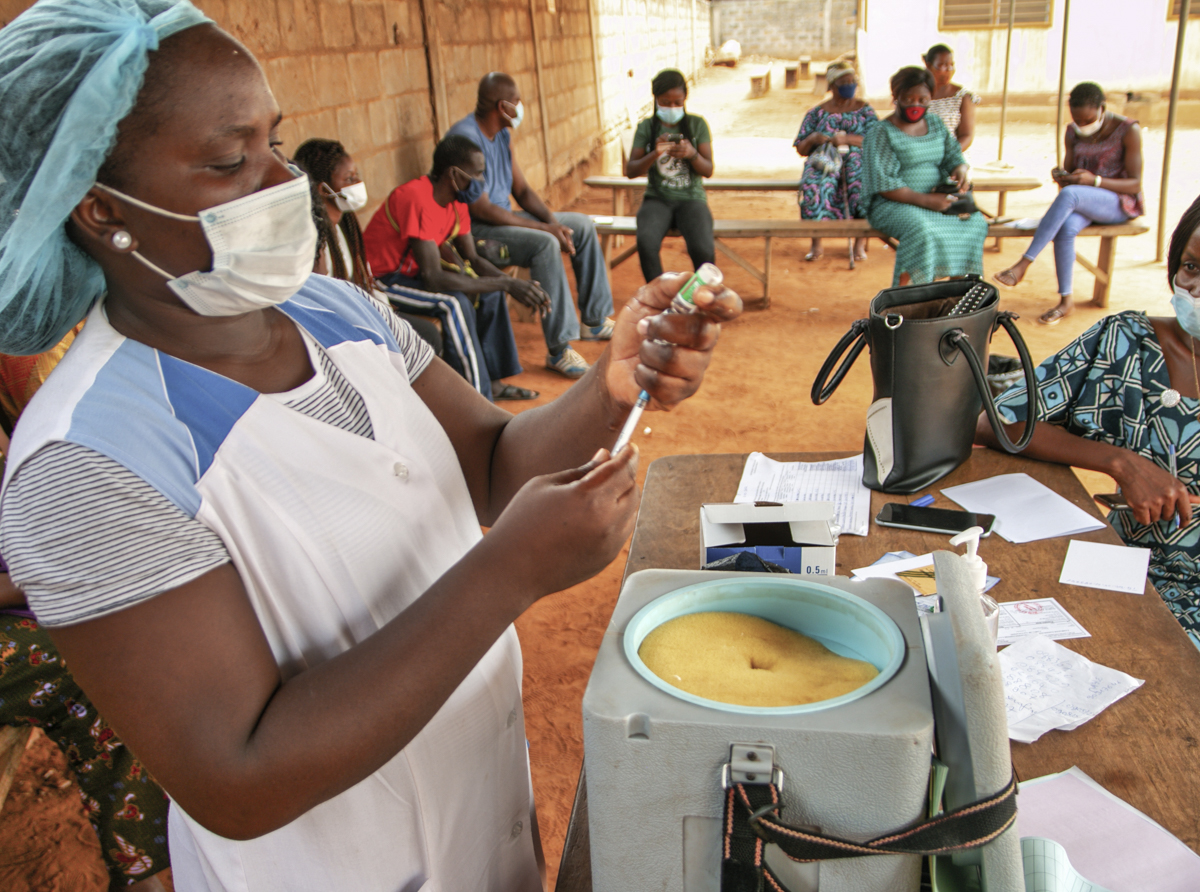
5:
A ce moment de cette histoire, je désirais aussi me faire vacciner quand j’aurais l’opportunité de le faire. Ce désir était accentué par mes recherches pour cet article. Alors que j’étais sur le point de boucler ce reportage, je me suis permis une pause pour m’aérer un peu l’esprit et je profitais pour aller rendre visite à un oncle, M Cyprien, un Assistant Médical opérant dans le quartier de Bè, à Lomé. Je tenais à leur présenter à lui et ses enfants mes condoléances pour la perte de son ex-épouse, la mère de quatre de ses enfants.
Après les salutations d’usage, sa réaction me cueillit à froid avec la nouvelle d’un autre décès dans notre famille : « Te rappelles-tu de Tante Dina ? Elle est décédée ce matin, des suites d’une crise qu’elle a eu hier après avoir pris le vaccin AstraZeneca. »
Il était à la fois triste et un peu remonté, et il explosa : « Je disais depuis le début qu’il fallait faire attention avec ce vaccin, après tout ce que les Européens ont rapporté comme effets secondaires et complications. »
Il a ajouté que les gens meurent suite à cette vaccination, mais le gouvernement cache la vérité.
Pour chaque famille qui perd une personne suite à cette vaccination, il sera difficile de prouver que cette mort n’est vaine, encore plus difficile de les convaincre d’aller se faire vacciner. Et ça, ce n’est pas le fruit des théories complotistes, mais juste la réalité vécue par cette famille.
At this point in this story, I wanted to be vaccinated when I had the opportunity to do so. This desire was accentuated by my research for this article. But as I was about to complete my work, I took a break to clear my head and went to visit an uncle, Mr. Cyprien, a medical assistant in the Bè neighborhood of Lomé. I wanted to offer him and his children my condolences for the loss of his ex-wife, the mother of four of his children.
After the usual greetings, his reaction caught me cold with the news of another death in our family: “Do you remember Aunt Dina? She died this morning, from a seizure she had yesterday after taking the AstraZeneca vaccine.”
Both sad and a bit wound up, he exploded, “I’ve been saying all along that we should be careful with this vaccine after all the side effects and complications the Europeans have reported.”
People are dying as a result of this vaccination, but the government is hiding the truth, he added.
For every family that loses a person following their vaccination, it will be difficult to prove that the death was not pointless and even harder to convince the relatives of this person to be vaccinated. And this, this is not the result of conspiracy theories, but just the reality experienced by that family.
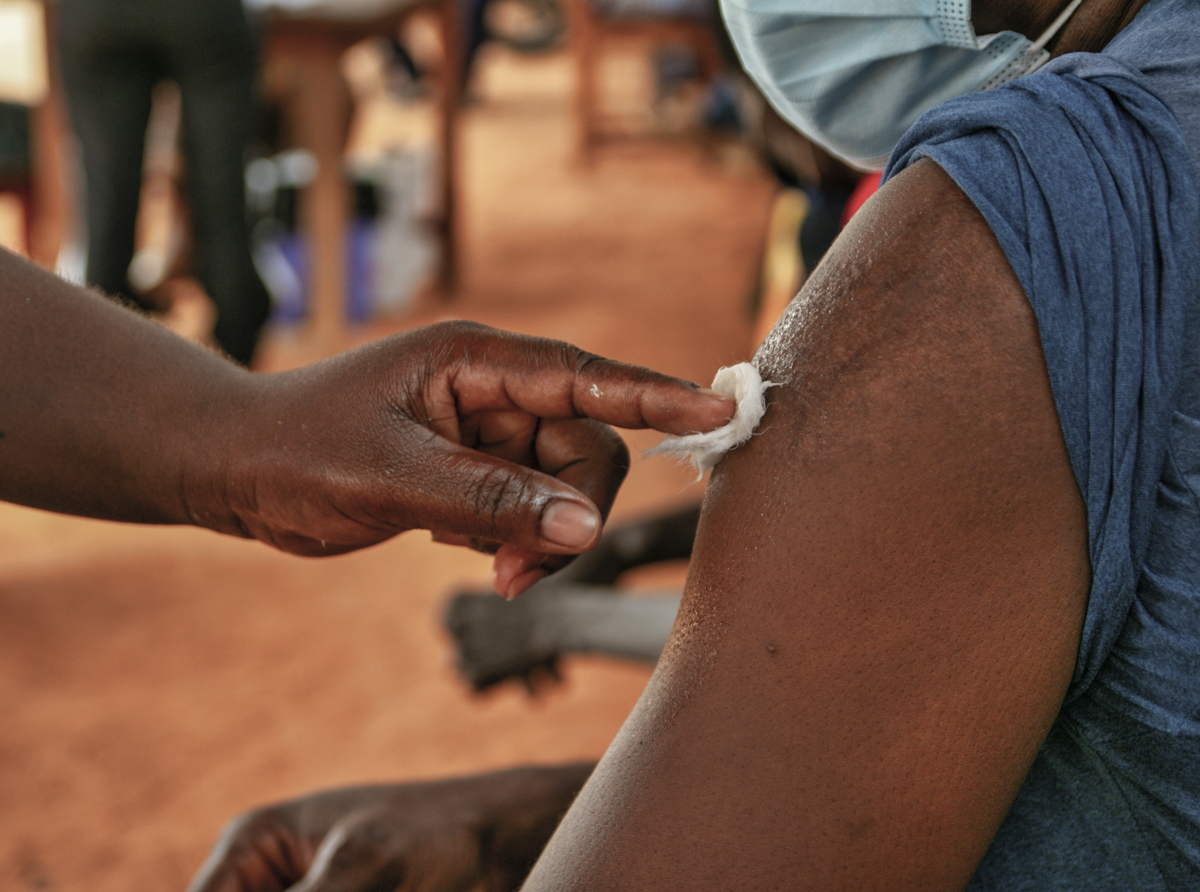
6:
Entretien avec le Docteur Kolani, Médécin Généraliste, Chef de la Clinique Sainte Famille à Lapampa, Adidogomé, Lomé
« Quand on a une maladie comme ça qui tue, qui affecte beaucoup et pour laquelle on est arrivé à sortir un vaccin, même si ce vaccin-là n’est pas aussi perfectionné comme on aurait pris le temps de le faire, de toutes les façons il y a des expériences qui ont été faites et qui donnent des taux d’efficacité qui dépassent les 70%, déjà c’est bon. Ce qui voudrait dire que lorsqu’on prend 100 personnes, il y a 70 personnes qui vont répondre très bien et il y en a qui ne vont pas répondre aussi. »
« Mais il faut savoir aussi qu’un vaccin, c’est comme une semence que l’on met en terre. Donc pour produire des anticorps, la réponse ne dépend pas toujours de la qualité de la semence, ça dépend également du terrain. Et nous ne sommes pas les mêmes. C’est pour ça d’ailleurs que les réactions allergiques, et les effets secondaires également, ne peuvent pas être évités ou peuvent être possibles, puisque nos organismes sont différents. »
« C’est ce qui m’a amené à faire mon vaccin, parce qu’en pesant la balance risque et efficacité, j’ai plutôt opté pour l’efficacité que de prendre un risque, même si l’efficacité n’est pas 100%. »
« C’est donc plutôt une bonne chose que la campagne de vaccination ait commencé, pour dissiper les craintes des uns et des autres et pour contrer les fausses informations que les gens colportent un peu partout actuellement. »
Après mon entretien avec le docteur, j’ai pu discuter un peu avec les infirmières qui avaient également toutes été vaccinées.
« Un léger mal de tête, qui s’est dissipé avec un comprimé de paracétamol », me rassura l’une. « Une petite enflure du bras, à l’endroit où le vaccin a été inoculé, mais qui s’est réduite le lendemain », me confirma l’autre.
Interview with Dr. Kolani, General Practitioner, Head of the Sainte Famille Clinic in Lapampa, Adidogomé, Lomé
“When you have a disease like this that kills, that affects many people, and for which we have managed to produce a vaccine, even if this vaccine is not as perfect as we would have taken the time to make it, in any case there are experiments that have been done and that give efficacy rates that exceed 70%, already that is good. This would mean that when we take 100 people, there are 70 people who will respond very well, and there are some who will not respond as well.”
“But it is also important to know that a vaccine is like a seed that you put in the ground. So to produce antibodies, the response does not always depend on the quality of the seed, it also depends on the terrain. And we are not the same. That’s why allergic reactions, for instance, and side effects as well, can’t be avoided or can be possible, since our organisms are different.”
“That’s what led me to get my vaccine, because when I weighed the balance between risk and efficacy, I went for efficacy rather than taking a risk, even though the efficacy is not 100%.”
“It’s a good thing that the vaccination campaign has started, in order to allay everyone’s fears and to counter the misinformation that people are peddling all over the place right now.”
After my interview with the doctor, I was able to chat a bit with the nurses. They had all been vaccinated as well.
“A slight headache, which went away with a paracetamol tablet,” one of them reassured me. “A little swelling in the arm, where the vaccine was injected, but that subsided the next day,” the other confirmed.
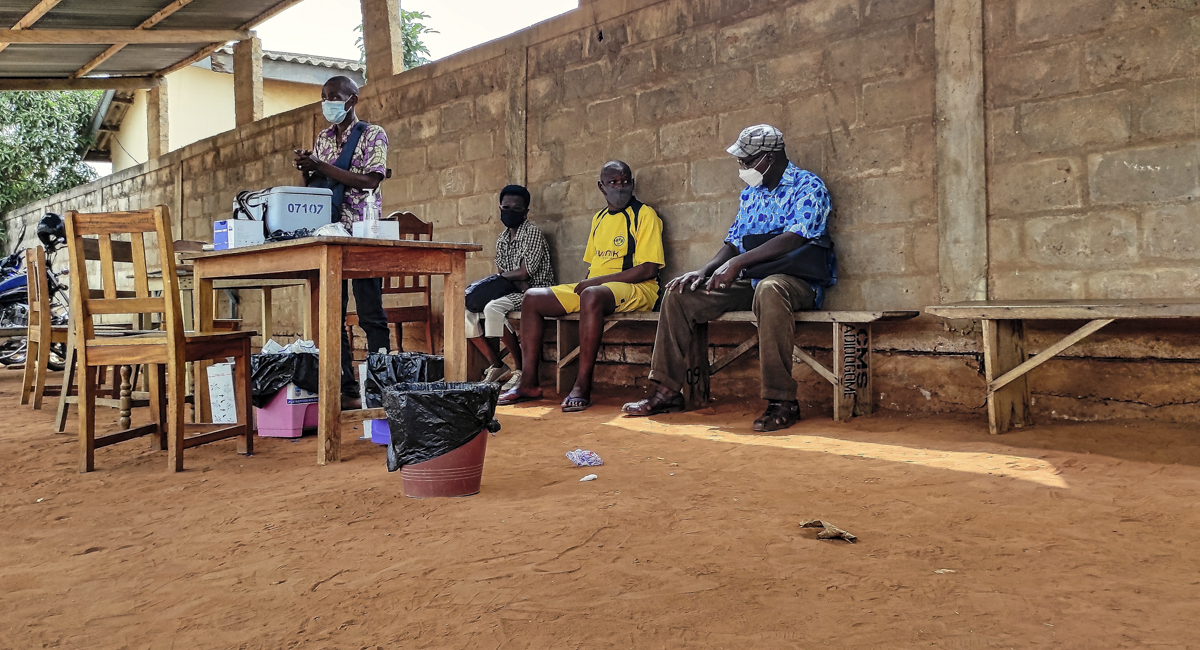
7:
Je me suis rendu dans l’un des centres de vaccination dans le quartier Adidogomé, le Centre Médical et Social d’Adidogomé.
En début d’après-midi il y avait très peu d’affluence, mais j’y rencontrai deux personnes, âgées de plus de 50 ans, venues pour se faire vacciner. Je n’avais qu’une seule question pour elles : « Pourquoi avez-vous décidé de vous faire vacciner contre la Covid-19, malgré toutes les craintes exprimées ça et là ? »
« Moi, j’ai décidé de me faire vacciner parce qu’il faut toujours mourir de quelque chose et si en cherchant à me protéger, cela entraîne la mort, c’est que mon temps est venu », Mme Akoss, une formatrice sociale à la retraite, m’a répondu.
Pour le second, M Koffi, « Ce sont ceux qui n’ont pas la vraie information qui se laissent distraire : moi, je sais que ce vaccin est une solution efficace pour nous protéger contre cette maladie. C’est pourquoi je n’ai pas hésité à venir me faire vacciner ».
Tous les deux se portaient bien après avoir reçu leur première dose du vaccin AstraZeneca. Ils purent repartir après les 15 minutes d’observation réglementaire requise par les agents de vaccination.
Et toi, cher lecteur, que feras-tu ? Es-tu déjà vacciné ? Si oui tu es chanceux ! Sinon, tu as toujours la possibilité de le faire !
I went to one of the vaccination centers in the Adidogomé neighborhood, the Centre Médical et Social d’Adidogomé.
In the early afternoon there were very few people there, but I met two who had come to be vaccinated, both over 50 years old. I had only one question for them: “Why did you decide to be vaccinated against COVID-19, despite all the fears expressed here and there?”
“I decided to get vaccinated because you have to die of something, and if trying to protect myself leads to death, then my time has come,” Mrs. Akoss, a retired social trainer, responded.
For the second, Mr. Koffi, “It’s those who don’t have the real information who let themselves be distracted: I know that this vaccine is an effective solution to protect us against this disease. That is why I did not hesitate to come and be vaccinated.”
Both were doing well after receiving their first dose of the AstraZeneca vaccine and were able to leave after the 15-minute observation period required by the vaccinators.
And you, dear reader, what will you do? Are you already vaccinated? If so, you are lucky! If not, you still have the opportunity to do so!
